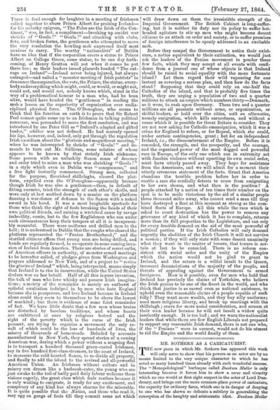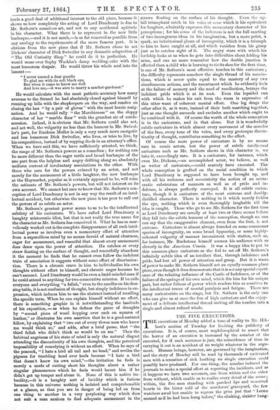MR. SOTHERN AS A CAEICATURLST.
THE new piece in which Mr. Sothern has appeared this week will only serve to show that his powers as an actor are by no means limited to the very unique character in which he has acted so many hundred times already with such wonderful success. The " Monopolological" burlesque called Bunkum Muller is only interesting because it forces him to show a verve and vivacity which no one would at first sight suspect in the actor of Lord Dun- dreary, and brings out the more common-place power of caricature, the capacity for ordinary farce, which one is in danger of denying to one who has shown so delicate a subtlety in generalizing the conception of the haughty and aristocratic idiot. Bunkum Muller
lends a good deal of additional interest to the old piece, because it shows us how completely the acting of Lord Dundreary is due to Mr. Sothern's conscious art, and not to any accidental aptitude in his character. What there is to represent in the new little burlesque,—and it is not much,—is as far removed as possible from any analogy to the requirements of the more famous part. It is obvious from the new piece that if Mr. Sothern chose to act Dickens' character of Dick Swiveller in any dramatic adaptation of "The Old Curiosity Shop" he could do it to perfection. He
would muse over Sophy Wackles's damp wedding-cake with the most humorous despair. He would throw his whole soul into the lament:—
"I never nursed a dear gazelle
To glad me with its soft black eye,
But when it came to know me well And love me,—it was sure to marry a market-gardener."
He would calculate with the most pathetic accuracy how many avenues to the Strand he had absolutely closed against himself by running up bills with the shopkeepers on the way, and resolve on closing the last " by a pair of gloves " with the most heroic resig- nation. And he would rally " the Marchioness" on the sloppy character of her " marble floor " with the grandest air of conde- scension. Indeed, it is obvious that Mr. Sothern could also act, and act well, the vulgarity no less than the humour in Mr. Swivel- ler's part, for Bunkum Muller is only a very much more energetic and less humorous Dick Swiveller, who lives, or tries to live, by his compositions, instead of by copying deeds in an attorney's office. When we have said this, we have sufficiently attested, we think, the range of Mr. Sothern's powers as a comedian ; for nothing can be more different than the eager rattle and broad burlesque of the one part from the helpless and angry drifting along an absolutely uniform current of involuntary associations in the other. With those who care for the powers evinced by an actor, and not merely for the amusement of a little laughter, the new burlesque at the Haymarket, popular as it certainly appeared to be, will raise the estimate of Mr. Sothern's powers, but will not interest on its own account. We cannot but care to know that Mr. Sothern's con- ception of Lord Dundreary is not in any way the result of an intel- lectual accident, but otherwise the new piece is too poor to call out the powers of so subtle an actor.
Mr. Sothern's greatest power seems to us to be the intellectual subtlety of his caricature. We have called Lord Dundreary a haughty aristocratic idiot, but that is not really the true name for the character as Mr. Sothern has conceived it. What he has so mar- vellously worked out is the complete disappearance of all such intel- lectual power as involves even a momentary effort of attention from a supercilious mind by no means devoid of natural clearness,
eager for amusement, and resentful that almost every amusement does draw upon the power of attention. He catches at every straw floating on the surface of thought, and resentfully abandons it the moment he finds that he cannot even follow the indolent train of association it suggests without some effort of discrimina- tion. There is a chronic crave in him to individualize his own thoughts without effort to himself, and chronic anger because he can't succeed. Lord Dundreary would be even a lucid-minded man if he could attend to anything for two consecutive minutes. If he calls everyone and everything "a fellah," even to the candles on his dres- sing-table, it is not confusion of thought, but simply indolence in ex- pression, which induces him to use the abstract instead of recalling the specific term. When he can explain himself without an effort,
there is something graphic in it notwithstanding the lassitude of his exposition, — as when he defines the game of draughts by "wound piece of wood hopping over each on squares of leather," or illustrates his own assertion that he is a good-natured fellow, by explaining that " two out of every thwee men who know me would think so," and adds, after a brief pause, that " the third fellah who didn't think so would be an ass." Then the habitual angriness of his state of mind is only the natural disgust attending the discontinuity of his own thoughts, and the perceived impossibility of remedying it without an effort. When he says of the peacock, "I hate a bird all tail and no head," and reviles the pigeons for tumbling head over heels because " I hate a bird that doesn't know its own mind,"—the irritation he feels is merely a mode of cutting short his thoughts about a rather singular phenomenon which he feels would haunt him if he
didn't get up temper and abuse it. None of this is native im- becility,—it is a haughty sort of lucidity which is furious
because in this universe nothing is isolated and comprehensible at a glance, so that you are in danger of being led on from one thing to another in a very perplexing way which does not suit a man anxious to find adequate amusement in the
straws floating on the surface of his thought. Even the up- hill triumphant catch in his voice or crow which is his equivalent for laughter, admirably expresses this momentary character of his perceptions ; for his sense of the ludicrous is not the full meeting of two incongruous ideas in his imagination, but a mere point, a spark, an infinitesimal gleam of incongruity, which it is a triumph to him to have caught at all, and which vanishes from his grasp just as he catches sight of it. The angry stare with which his lordship looks at us when he gets into difficulties about folding his arms, and can no more remember how the double junction is effected than a child who is learning to tie its shoe for the first time, is one of Mr. Sothern's most effective touches in this caricature ; the difficulty represents somehow the single thread of his associa- tions, which is never quite equal to the mastery of any two simultaneous actions, and the resentment which he evidently feels at the failure of memory and the need of recollection, betrays the
indolent pride which is at its root. Even the lopsided run with which he makes his exit from the room is expressive of this utter want of coherent mental effort. One leg drags the other after it, as it were, instead of their both marching together, just as one thought succeeds and excludes another which ought to be combined with it. Of course the worth of the whole conception is in the caricature, and in that alone. But it is wonderfully subtle caricature in which almost every movement of the muscles of the face, every tone of the voice, and every grotesque discon- tinuity of thought, contributes something to the effect.
Of course the mere power of caricature is by no means rare in comic actors, but the power of subtle intellectual caricature such as Mr. Sothern shows in this character is, we take it, exceedingly rare. It is a caricature, for instance, which even Mr. Dickens,—an accomplished actor, we believe, as well as writer of caricature,—could scarcely have executed. The whole conception is grafted on the social condition in which Lord Dundreary is supposed to have been brought up, and with all his rudeness and eccentricity the notion of an aristo- cratic substratum of manners as well as of pride and in- dolence, is always perfectly conveyed. It is all subtle carica- ture, though it is caricature of the most extreme and doubly- distilled character. There is nothing in it which merely tickles the eye, nothing which is even thoroughly laughable till the idea is caught. Those who go to see Mr. Sothern for the first time as Lord Dundreary are usually at least two or three scenes before they fall into the subtle humour of the conception, though no one can say that the exaggerative element, even from the first, is not extreme. Caricature is almost always founded on some commoner species of incongruity, on some broad hypocrisy, or some highly- coloured vulgarity of manner inconsistent with station, such as, for instance, Mr. Buckstoue himself amuses his audience with so cleverly in the American Cousin. It was a happy idea to put in this common-place caricature as the foil to set off Mr. Sothern's infinitely subtle idea of an intellect that, through indolence and pride, had lost all power of attention and grasp. But it is waste of power to make Mr. Sothern himself act an equally common-place piece, even though it does demonstrate that it is not any special experi- ence of the relaxing influence of the Castle of Indolence, or of the failure of the springs of his own mind, which fits him for his unique part, but rather fulness of power which renders him so sensitive to the intellectual traces of mental paralysis and fatigue. There are many caricaturists on the stage, but Mr. Sothern is the only one who can give us at once the fun of high caricature and the enjoy- ment of a delicate intellectual thread uniting all the touches into a single and almost refined whole.































 Previous page
Previous page